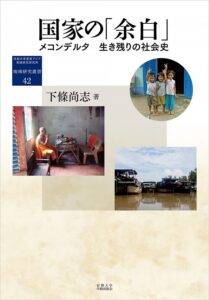This post is also available in: Japanese
 42. Intangible Spaces: A Social History of Survival in the Mekong Delta.
42. Intangible Spaces: A Social History of Survival in the Mekong Delta.
SHIMOJO, Hisashi
February 2021
Kyoto University Press
Description
The Mekong Delta is known as one of the world’s leading rice producers, but it is also one of the greatest conflict areas of the late 20th century. Throughout history, a series of states have attempted to territorially enclose and govern the delta region, using statistics, classification, documentation, mapping, and violence. For their part, local people, mainly Khmer, Chinese, and Viet, have struggled to survive and reorganize their own social order. This book analyzes oral histories and ethnographic data from a multiethnic delta village, which reveal: experiences of ethnic hybridity, undocumented transnational movements (of people, goods, and information), military draft evasion at Buddhist temples during the Vietnam War, and thriving black markets during the socialist collectivization era. These “intangible spaces” have repeatedly shrunk and reappeared in different forms in response to political and social conditions, even in the modern and contemporary eras. Still today, the Vietnamese state is unable to fully comprehend or control the mobility, hybridity, illicit economic activity, and religious spaces of the multiethnic society that is the Mekong Delta.